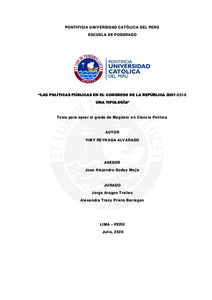| dc.contributor.advisor | Godoy Mejía, Jose Alejandro | |
| dc.contributor.author | Reynaga Alvarado, Yimy | |
| dc.date.accessioned | 2020-10-27T23:19:23Z | |
| dc.date.available | 2020-10-27T23:19:23Z | |
| dc.date.created | 2020-07 | |
| dc.date.issued | 2020-10-27 | |
| dc.identifier.uri | http://hdl.handle.net/20.500.12404/17392 | |
| dc.description.abstract | La presente tesis pretende demostrar, desde la teoría de las políticas públicas y
aplicando la tipología desarrollada por Tehodore J. Lowi, que las políticas
públicas de mayor trascendencia para el sistema político tienen su punto de
partida o su decisión final en el Congreso y no en el Poder Ejecutivo, en sus
distintos niveles de Gobierno.
Para tal efecto, se revisaron las decisiones políticas emitidas por el Congreso, en
la forma de proyectos de ley aprobados entre los años 2001 y 2016, y
clasificadas en el marco de la tipología señalada.
Posteriormente, se comparan los roles protagónicos del Ejecutivo y del
Legislativo en el proceso de elaboración de propuestas de ley en el marco de las
políticas públicas de gobierno, a fin de verificar la convergencia de ambos
poderes, en un proceso de agregación de intereses, el cual involucra a un gran
número de actores, estatales, para estatales y sociales.
Finalmente, se efectua un diagnóstico del proceso de toma de decisiones en el
Congreso, con el objetivo de ensayar una propuesta para racionalizarlo y
mejorarlo. | es_ES |
| dc.description.abstract | Applying the theory of public policies and the typology developed by Tehodore J.
Lowi, this thesis claims to demonstrate that the most relevant public policies
having an effect in the political system, are originated or decided within the
Congress and not by the Executive Branch in any of its different levels of
government.
For this purpose, we start by reviewing the political decisions adopted by the
Congress in the form of bills approved between 2001 and 2016, and then we
classified these decisions within the framework of the Lowi’s typology.
Later, we compare the leading roles of the executive and legislative branches in
the process of drafting bills regarding public policies so as to verify the
convergence of both powers, in a process of interest aggregation which involves
a large number of social, state and parastate actors.
Finally we make a diagnosis of the decisión making process at the Congress,
with the purpose of testing a proposal for its rationalization and enhacement. | es_ES |
| dc.language.iso | spa | es_ES |
| dc.publisher | Pontificia Universidad Católica del Perú | es_ES |
| dc.rights | info:eu-repo/semantics/openAccess | es_ES |
| dc.rights.uri | http://creativecommons.org/licenses/by-sa/2.5/pe/ | * |
| dc.subject | Perú. Congreso | es_ES |
| dc.subject | Práctica parlamentaria--Perú | es_ES |
| dc.subject | Políticas públicas--Perú | es_ES |
| dc.title | Las políticas públicas en el Congreso de la República 2001-2016: una tipología | es_ES |
| dc.type | info:eu-repo/semantics/masterThesis | es_ES |
| thesis.degree.name | Magíster en Ciencia Política | es_ES |
| thesis.degree.level | Maestría | es_ES |
| thesis.degree.grantor | Pontificia Universidad Católica del Perú. Escuela de Posgrado | es_ES |
| thesis.degree.discipline | Ciencia Política | es_ES |
| renati.advisor.orcid | https://orcid.org/0000-0003-3692-1242 | es_ES |
| renati.discipline | 312027 | es_ES |
| renati.level | https://purl.org/pe-repo/renati/level#maestro | es_ES |
| renati.type | http://purl.org/pe-repo/renati/type#tesis | es_ES |
| dc.publisher.country | PE | es_ES |
| dc.subject.ocde | https://purl.org/pe-repo/ocde/ford#5.06.00 | es_ES |






